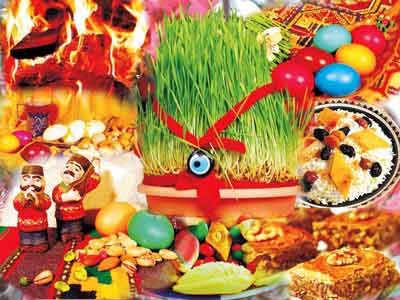Home page
» ETHNOGRAPHY
» Holidays
» National Holidays
National Holidays March 20-21 – Novruz Holiday Novruz is celebrated as holiday in large scale in connection of approval of spring and dedicated to ending of winter and coming of spring. This holiday has ancient history. In ancient Babylon this holiday continued for 12 days. However, each of the 12 days had its rituals (rites, ceremonies), own entertainments. In the first written source it is noted that the Novruz holiday was emerged in 505 BC. During the Soviet era\'s it was celebrated unofficially, because the authorities did not allow it and the people who were persecuted. But despite all this, being loyal to hundred-year old traditions, each Azerbaijani family celebrated this holiday. Waking of the nature, life begins from Novruz and the people of Azerbaijan begin to celebrate it one month prior to it in festive conditions. Thus, before the Novruz holiday Air, Water, Fire and Earth Wednesdays are celebrated. The most important among these Wednesdays is the last Wednesday. The same day is very rich in ancient traditions. At this day one wishes a family happiness and being away from all misfortunes. Holiday parties are arranged in all houses. From the ancient times special training for this wonderful evening was carried out. First house and home is cleaned, a special holiday purchases are made. Malt is germinated, egg is painted, wheat is roasted, pulao is cooked, sweets are prepared. This holiday, especially is celebrated more beautiful in rural areas. Everyone hurries to congratulate each other at this holiday, at holiday dinner in the evening candles according to a number of family members are burnt, and the intentions are kept. At the same evening, children visits different homes and get holiday gifts. People are rejoicing that night till the morning. Various dishes, mainly pulao, sweets are cooked. It is important to have a holiday tray at holiday table. Green malt is put in the center of tray and candles and painted egg is adjusted according to family members. There should be seven kinds of dishes. At that day everyone should be at his home, but children should visit their parents and must return to their homes. There\'s a holiday tradition to listen to ear fortune telling. It is a tradition to go for listening talks of neighbors at dark time by having kept an intention. The first audible words are commented in accordance with the intention kept. So, beautiful words, hopeful talks should be carried out at homes in the evening of Novruz holiday. The tradition of keeping intent at the last Wednesday has ancient roots, too. One of the most popular traditions in Novruz holiday is dropping of the girdle. Mostly children and young people visit homes at dark time and drop girdle to get holiday gifts. There are interesting traditions relating to water and fire. As a land of fire Azerbaijan has rich traditions associated with fire and this is a sign of purification and clarification. Fires are set and before the Novruz, at last Wednesday regardless of sex, everyone jump over the fire seven times (seven times over one fire or one time over each seven fires). While jumping the following words are said: My yellowness to you, redness to me; My heaviness- success to be burn in fire. The fire is never extinguished with water. As fire was burn out its ash is collected and throw out outside of home. This means that all the family members jumped over a fire remove unluckiness from them by throwing the ash of fire. While celebrating Novruz peasants define how the coming year will be, either dry or rainy, the level of productivity. According to the tradition, the first day of Novruz is deemed as Spring, the second - Summer, third - Autumn, fourth - winter. If first day will be without wind and rain, it means this spring will be suitable for agricultural works. On the contrary, it will be rainy, windy, it means all spring will be same. With the remaining three days it is defined how the summer, autumn and winter will be. Novruz is a holiday that combines all items of the people in self.
|
